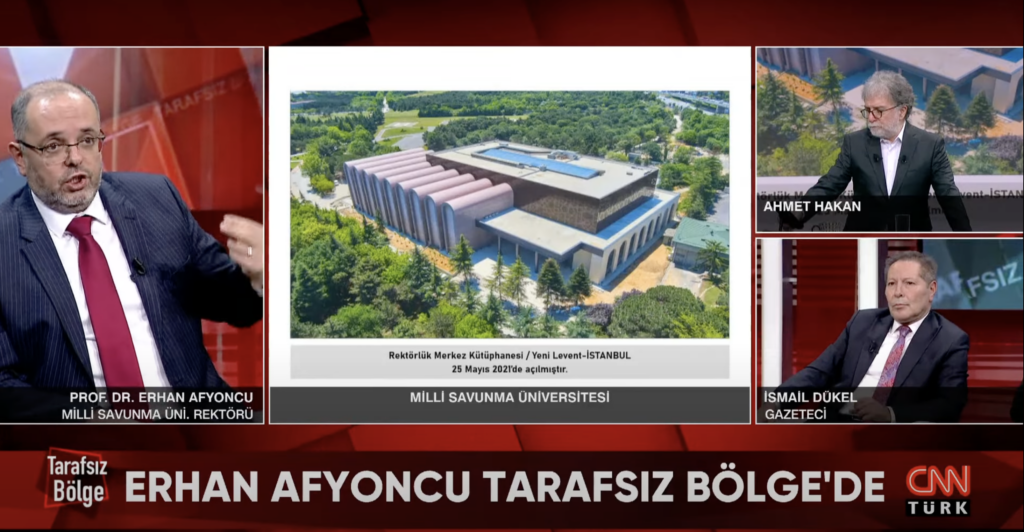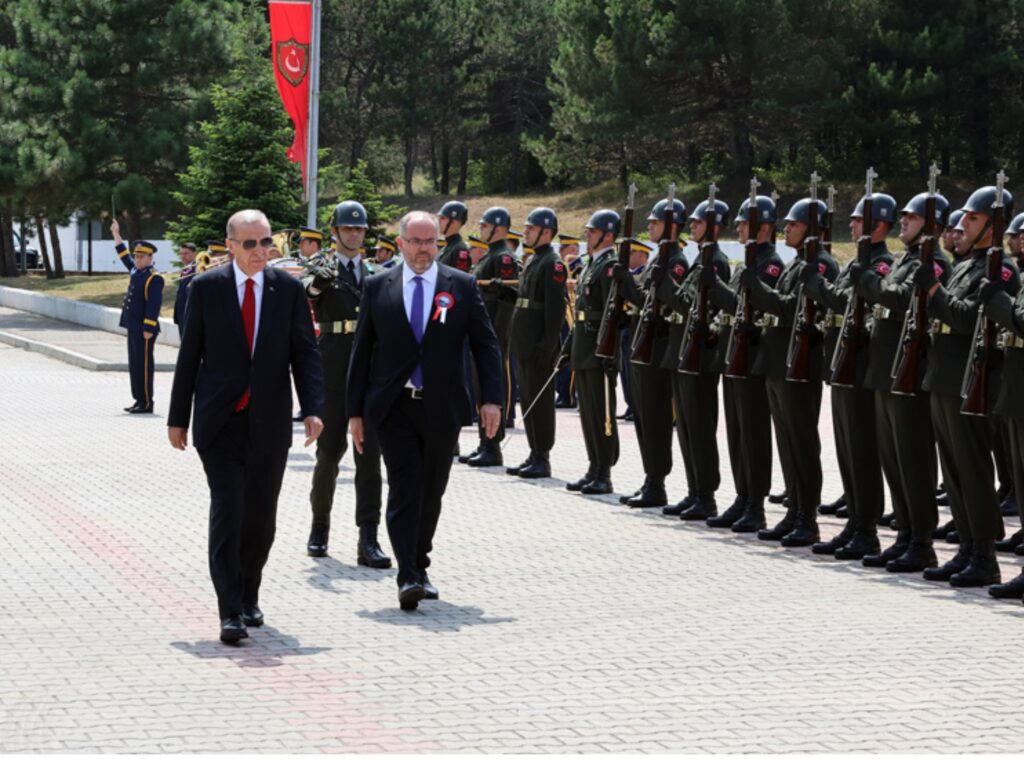Levent Kenez/Stockholm
Erhan Afyoncu, the president of Turkey’s state-owned National Defense University, revealed in a live interview on the pro-government CNN Türk TV station on February 17 that the overwhelming majority of personnel dismissed from the Turkish Armed Forces in 2016 had no direct connection to a coup attempt on July 15, 2016. He revealed that these dismissals were largely based on intelligence reports prepared by Turkey’s National Intelligence Organization (MİT) and the use of a software program called “Fetömetre,” which was designed to identify alleged members of the Gülen movement, a group critical of President Recep Tayyip Erdogan. Afyoncu’s statement validates ongoing concerns that thousands of military personnel were dismissed not due to proven involvement in the coup attempt but rather as a result of mass profiling and the use of algorithmic methods.
In the aftermath of the 2016 coup attempt, Erdogan tightened his grip on power, consolidating his control over the judicial, legislative and executive branches. Mere hours after the coup had begun, his government initiated a sweeping purge, removing 4,156 judges and prosecutors from their posts — an indication that these individuals had likely been blacklisted beforehand. Their positions were quickly filled with government loyalists, many of whom were selected from within the ranks of the ruling Justice and Development Party (AKP).
Critics and opposition groups have even suggested that the coup attempt itself may have been orchestrated as a pretext to eliminate Erdogan’s political adversaries. As a result of the crackdown, more than 130,000 public sector employees as well as 24,706 military personnel were expelled from service.

The term “Fetömetre” that Afyoncu mentions during the interview is derived from a derogatory expression used by the Erdogan government to refer to the Gülen movement, which it holds responsible for the attempted coup. However, the Fetömetre system has become one of the most controversial tools of mass persecution in modern times. Developed by ultranationalist retired admiral Cihat Yaycı, this Excel-based algorithm was designed to identify supposed members of the Gülen movement in the Turkish Armed Forces.
However, as detailed in the “Algorithmic Persecution in Turkey’s Post-Coup Crackdown: The Fetö-meter System” report by Dr. Emre Turkut and Ali Yıldız, published by Statewatch, a UK-based charity that produces critical research, policy analysis and investigative journalism to inform debates and campaigns on civil liberties, human rights and democratic standards, the system is not only legally and technically flawed but also profoundly unjust, leading to mass dismissals, arbitrary detentions and serious human rights violations.
At its core, the Fetömetre operates on an arbitrary point-based system, assigning numerical values to over 290 different criteria, many of which have no concrete or logical connection to criminal activity. Factors such as opening a bank account, attending specific universities or having a relative accused of terrorism all contribute to an individual’s score. More disturbingly, the system also penalizes personal beliefs and lifestyle choices. For example, expressing opposition to abortion, regarding the birth of a disabled child as natural or even having strong religious views outside state-approved norms can increase a person’s “risk score.” These criteria reflect not a security measure but a deeply invasive and ideological attempt to police personal morality.
The technical flaws of the Fetömetre make its use even more dangerous. The methodology behind the algorithm remains undisclosed, making it impossible to verify the reliability of its assessments. Data from financial transactions, social media activity, family history and even health records are compiled without any legal basis. The report notes that the system has processed the personal information of at least 810,000 people, with no due process or independent review. In many cases, individuals with no known links to any political movement were flagged and subjected to harsh professional and legal consequences based solely on algorithmic suspicion.
Beyond targeting individuals, the Fetömetre also punishes family members and social circles. Having a relative who was dismissed from a public institution, studied at a university closed by decree or simply made a donation to a now-banned organization is enough to warrant suspicion. This guilt-by-association approach is a blatant violation of fundamental legal principles, including the right to individual responsibility and the presumption of innocence.
The Statewatch report also highlights the parallels between the Fetömetre and historical discriminatory systems. Similar to how the Nazi-era Mischling Test categorized individuals based on racial background, the Fetömetre does not assess personal actions but instead criminalizes identities, beliefs and associations. This approach not only violates Turkey’s own constitutional protections but also contradicts international human rights standards.
Afyoncu also added that some military personnel who were discharged had been expelled due to their communications through payphones. The so-called “payphone investigations” are based on call records. Prosecutors allege that a member of the Gülen movement used a single payphone to consecutively call all of his contacts. Based on that assumption, when an alleged member of the movement is found in call records, it is presumed that other numbers called right before or after the primary call also belong to people with Gülen links. Authorities do not possess the content of the calls in question. The presumption of guilt is solely based on the order of the calls made from the phone.
Afyoncu is not just any figure in Erdogan’s government. As a loyalist, he was personally selected by the president to head the National Defense University (Milli Savunma Üniversitesi), despite lacking a military background, unusual for someone overseeing a military institution.
The university was abruptly established by the government in 2016 immediately after the controversial coup attempt to replace the war academies (Harp Akademileri), which had been training highly qualified officers for the Ottoman and Turkish armies since 1848, in order to create a centralized system focused on training officers loyal to the government. The National Defense University trains both commissioned and noncommissioned officers for the air force, navy and land forces and operates directly under the Ministry of Defense. The graduates have promising careers ahead, with the potential to advance quickly through the ranks to become generals and admirals.
The university is part of Erdogan’s broader initiative to reshape the Turkish military into a force dedicated to protecting his regime and advancing his political objectives, which may not always align with Turkey’s national security interests.

Nordic Monitor previously reported that Afyoncu marked the Turkish football team’s victory over Austria in the UEFA European Championship with a historical reference on X on July 2, 2024. “Vienna has fallen 341 years later,” he wrote, drawing a parallel to the failed Ottoman siege of Vienna in 1683. The Ottoman attempt to capture Vienna was a pivotal moment in history as the city was a key trade hub and strategic location. Its conquest would have opened the door for further Turkish expansion into Europe. Afyoncu also paid tribute to Merzifonlu Kara Mustafa Pasha, the grand vizier who led the ill-fated military campaign. “May the souls of Merzifonlu Kara Mustafa Pasha, who gave his life for the Kızılelma [Red Apple] in front of Vienna, and all our martyrs be blessed,” Afyoncu wrote. In Turkish literature, the term “Kızılelma” symbolizes a vision of conquering lands beyond existing borders, driven by a pan-Turkic or pan-Islamic ideology. It represents the ambition to establish a global empire, rooted in a mythical vision of destiny.
Additionally, Afyoncu’s remarks on CNN Türk, where he stated, “I am a nationalist conservative. When you are a historian, you automatically become a Turkish nationalist. Your profession pushes you in that direction,” sparked controversy within the academic community. Many historians and academics criticized his comments on social media, stating that such views are incompatible with academic thought and independence.












